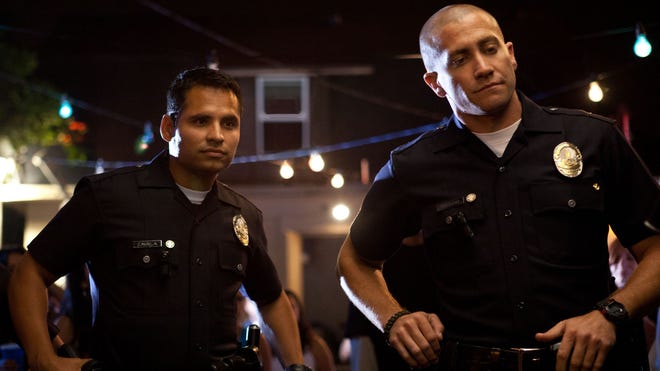 |
| Goodman, Arkin, Affleck, Argo, Warner Bros. Pictures, 2012. |
Ben Affleck has proven himself a strong director with two past good films, both crime dramas; The Town and the better Gone, Baby, Gone. His third film Argo trudges into past political territory. Everything is pretty well-done about it; Affleck is even impressive once more in the lead role. But for all the hyperbole surrounding its premier, a 'good' film has become one of the season's most touted. An international incident involving American hostages in Iran, and the CIA's clever plot to bust out some stashed Embassy workers does make for an entertaining, even thought-provoking movie. Affleck does a good job of culling it all together. For all the buzz, I was underwhelmed. The biggest impression I got was the rollicking fun and rapport between John Goodman and Alan Arkin, who all but steal the show.
 |
| Pena, Gyllenhaal, End of Watch, Open Road Films, 2012. |
David Ayer's career fixation on cops has made for a distinct voice among thriller directors; his scripts for Ron Shelton's Dark Blue and Antoine Fuqua's Training Day were nothing short of genre specific, complex and brilliant. His career as a helmer has been pretty much swept under the rug by indifferent audiences and critics. His first two films were excellent: Harsh Times and Street Kings both stung with an authentic darkness and richness of character which reveal Ayer's gift as a writer. His third feature, End of Watch, may well be his weakest film, and yet betrays his talent as an artist. Using a cinema verite style, we delve into the rugged shifts of two young LAPD officers, in two strong turns from Jake Gyllenhaal and Michael Pena. Numerous tour de force sequences do not wash away the picture's structural difficulties, many terse moments are grafted inspiring. There is no denying in the end, that Ayer is one of our most idiosyncratic filmmakers.
 |
| Willis, Gordon Levitt, Looper, FilmDistrict, 2012. |
Rian Johnson rises as one of his generation's most talented directors: after the intrinsic specialties of his quirky frosh-soph features, Brick and The Brothers Bloom, Johnson comes of age with one of the best genre films of the year, and definitely the strongest film overall of the three discussed here. Looper, however uneven, makes up for that in sheer cinematic bravado. Homaging Ridley Scott, Robert Zemeckis, Spielberg, et al, Johnson crafts an exhausting and imaginative compendium of a time-travel flick.
Joseph Gordon Levitt, in bizarre make up, and Bruce Willis, play the same man, who encounters his younger/older self amidst a dense plot filled with passion. Futuristic hit men forge a scheme which bends space and time to near perfection. Many moments Johnson crafted will remain in my mind's eye for some time. This side of Andrew Niccol, I don't believe any other director is authoring science-fiction this magical and cinematic.


